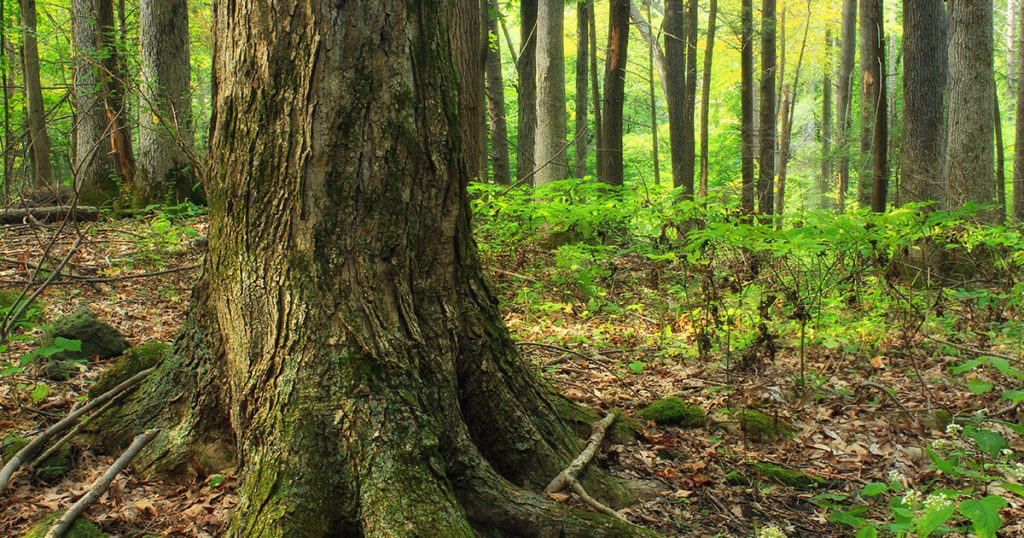It’s Not Easy Being Green
In an era of global warming, not all tree-related questions are equal.

Ronald Reagan claimed that trees cause more pollution than cars do, but most people today consider them essential to combat global warming. Ethiopia recently claimed to have planted 350 million of them in a single day, a record. The previous one, set in 2017, was a mere 66 million trees planted in Madhya Pradesh, India, according to Guinness World Records. Earth Day Network hopes to plant 7.8 billion trees next year, one for every person on Earth, and presidential hopeful Cory Booker wants to plant 15 billion trees in America by 2050.
Another approach is simply to hang on to the trees we already have, one taken by Native Americans in Wisconsin. Satellite photographs of a Menominee reservation there show a distinct patch of vernal earth containing 367 square miles of mostly forested land. Decades ago, the Menominees wrested control of their land, including its forests, away from federal overseers, and they’ve since turned the 235,000-square acres into a model of resource management.
Although the reservation has produced almost 500 million board-feet of wood since the mid-1800s, it still preserves a vast percentage of its trees, many of them old growth. The College of Menominee Nation includes a Sustainable Development Institute, which promotes a balanced environment and sets an example for other institutions of higher learning.
In the era of global warming, however, not all tree-related questions are equal. Georgetown University is currently roiled by a controversy that pits champions of trees against proponents of solar power. In trying to understand the Georgetown imbroglio, I quickly discovered a multitude of other considerations, including politics, institutional isolation, and, of course, money.
The dispute involves 537 leased acres of land in Charles County, Maryland, located 30 miles from the university and sometimes referred to as “the lungs of Washington.” Origis Energy, an energy company based in Miami, wants to install solar panels there to drastically reduce the carbon emissions of Georgetown University, which owns the land. All good, it would seem, except that there are trees on the site. Most of them are neither large nor old, according to the prospective developer, but opponents say the plan would cause a loss of habitat and biological diversity. All are trees, whatever their size, and would have to be cut down to provide room for the panels.
Although Origis’s preliminary assessment found that no significant damage to soil and water would occur, opponents vehemently disagree. They claim that degradation would take place, and local environmentalists point out that cutting down the trees would remove a third of the tree species growing on those 500-plus acres. “Down here we see this as colonialism,” says Linda Redding, who is part of a loose coalition of citizens and environmental groups opposed to Origis’s plan for Georgetown’s land. “[It’s] a case of outsiders coming into a relatively poor region and taking resources without any advantages for locals.”
The project would involve re-engineering the landscape on a large scale and would likely increase run-off into the Chesapeake Bay, a major setback in the years-long attempt to clean up the bay. “Georgetown,” says Redding, “doesn’t seem to have known what it was getting into.”
The university hasn’t yet addressed the controversy publicly or signed a final agreement. When I reached out for comment, Georgetown’s communications office could find no university official willing to discuss it, and instead suggested that I contact Origis. The project has also run afoul of Georgetown alumni and students who consider deforestation, even if done to make way for solar power, an unacceptable tradeoff. Neil Gormley, class of ’04 and an environmental lawyer for Earthjustice, told me that he was disappointed in his alma mater. “One of Georgetown’s key values is a respect for nature. This betrays that value,” he said. “I still hope Georgetown will do the right thing.”
GREEN, a Georgetown student-run environmental group, is similarly concerned about the Origis deal, and has participated in an information-gathering session held at the university to let Maryland locals and opposition groups argue their case before the university.
“The hardest thing for us has been Georgetown’s silence,” said Georgetown senior Amelia Walsh, a member of GREEN. “It’s vitally important that we hold the university accountable in how land is used.”
In late August, Maryland’s Environmental Secretary Ben Grumbles denied a permit for the solar farm, citing the adverse effects it would have on the Chesapeake Bay, as well as the loss of habitat vital to bald eagles, warblers, eastern whip-poor-wills and wood thrushes. “This is an unacceptable trade-off for the environmental benefits of clean energy,” he said, noting that habitat and water quality trump even clean energy.

